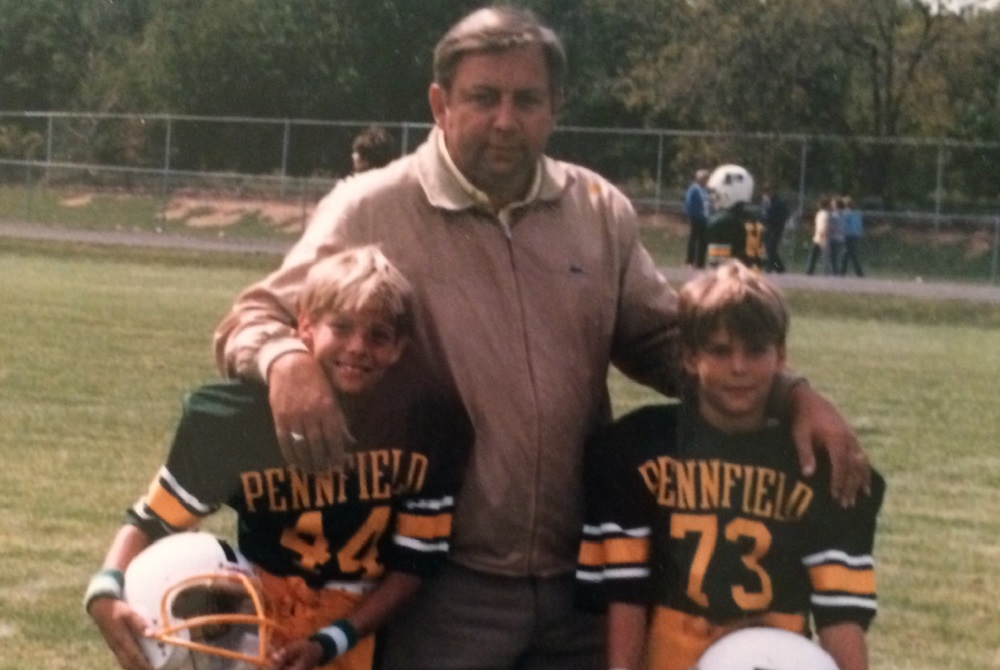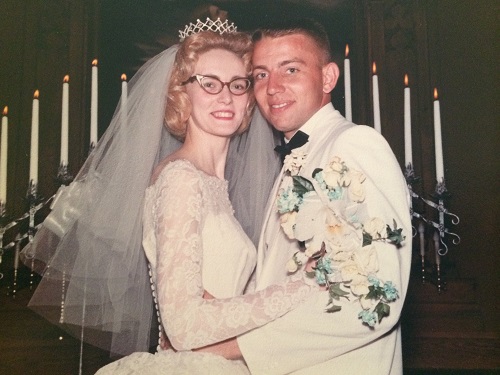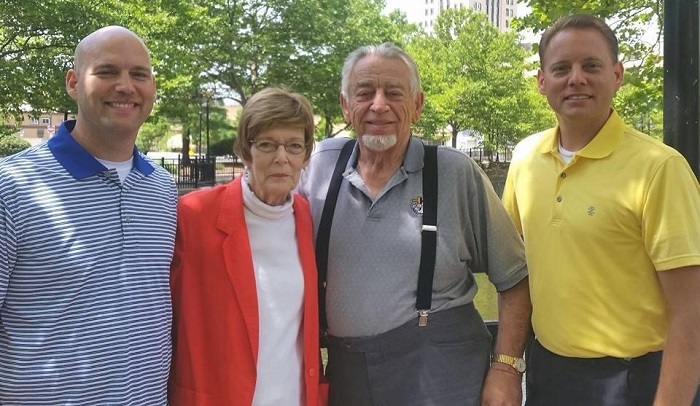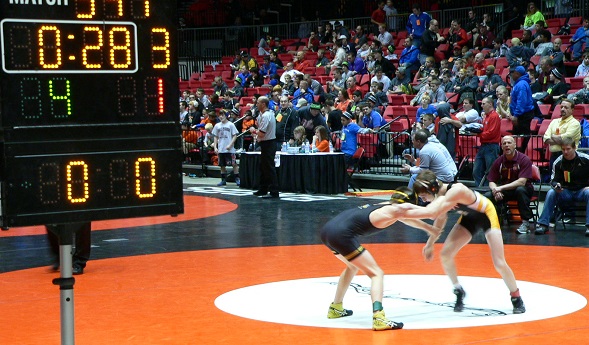
'Larger-Than-Life' Pennfield AD Admired for Statewide Service
By
Pam Shebest
Special for MHSAA.com
April 14, 2021
BATTLE CREEK — To many Battle Creek sports enthusiasts, Bernie Larson was known as “Mr. Pennfield.”
 But for two former athletes, twins Chris and Cam Larson, that was not the case.
But for two former athletes, twins Chris and Cam Larson, that was not the case.
“I never knew him or thought of him as Mr. Pennfield; he was Dad,” Chris said.
Larson, 78, who served as athletic director at Pennfield for 29 years, died March 14 after an extended illness.
A memorial service is being planned for May 15 at a time and place to be determined.
“A lot more remembrances come back when someone passes,” said Chris Larson, who lives in Virginia. “You hear so many stories from people who remember him, including former students and coaches.
“It’s great to hear the impact he had on so many people that you never knew about.”
Stories are plentiful when it comes to Bernie Larson.
“He was a heckuva golfer,” said Karen Leinaar, the current executive director of the Michigan Interscholastic Athletic Administrators Association (MIAAA) who during an early stop served as athletic director at Delton Kellogg, which with Pennfield for a time was part of the Kalamazoo Valley Association. “If you needed golf balls on the course, everyone said, ‘Just ask Bernie.’ He always had them.”
The reason?
“If he had one ball in his bag, he had 50 or 60 in his bag,” said Larry Wegener, former Battle Creek Central athletic director. “He had milk crates full of golf balls in his garage” that he found on the course or fished out of ponds.
Championship City
When Larson was named Pennfield’s athletic director in 1970, it became a family affair.
“I had no clue, no clue,” said Joni, Larson’s wife of 56 years. “We never trained to be wives of athletic directors. We learned the most from other wives.”
 She became involved in the job, selling tickets at home games. When their sons were old enough, they helped out with the field.
She became involved in the job, selling tickets at home games. When their sons were old enough, they helped out with the field.
“They knew where the flag was kept and how to play the national anthem. They learned how to keep score” and were active in playing sports, she recalled.
“Cam (who lives in Minnesota) played football, baseball and basketball,” Chris Larson said. “I played tennis, golf and basketball. We grew up playing little league baseball and football.”
One family favorite was the yearly athletic directors conference at Grand Traverse Resort.
“He was there for business; we kids were there for fun,” his son said. “As we got older, we went to the auditorium that was filled with booths with sports-related things.
“As a kid we went around and grabbed the swag. It was a kids of athletic directors thing.”
It was not all fun and games.
“Bernie Larson was instrumental putting Battle Creek on the map athletically,” Leinaar said. “Four of (the ADs), Bernie, Ralph Kenyon of Harper Creek, Glen Schulz of Lakeview and Larry Wegener of Central put on the tournaments and had crews of people every year right there helping.
“Their hard work and commitment to the MHSAA, running perfect tournaments, made Battle Creek a stop for athletics for many, many years. Many times, Bernie led the pack.”
In spite of his willingness to help others, there was a caveat, Leinaar said.
“He would say to me, ‘Karen, I’ll help you out however I can, but remember, Pennfield is going to win.’
“Pennfield joined the KVA in the late 1980s, so we saw each other quite a bit. Our football games were always barn burners as were track and field.”
 Wegener recalls those days full of tournaments and 65-hour work weeks.
Wegener recalls those days full of tournaments and 65-hour work weeks.
“We did so many MHSAA events, I think a lot of people thought we were on the staff,” he said.
Those tournaments included more than 50 state championships in baseball and softball, team and individual wrestling, volleyball and girls basketball.
Brett Steele, Pennfield’s current AD, said Larson “was still a strong presence in the athletic department and community as a whole even after he retired.
“Up until last winter, Bernie still helped out at football and basketball games as our officials host. He knew most of the officials in those sports and was a familiar face to many when they worked games at Pennfield.”
Larson had served as an MHSAA basketball and baseball official. He also helped found and is a member of the Pennfield Hall of Fame and coached both girls and boys golf.
He received the MHSAA’s Allen W. Bush Award in 1997, the MHSAA’s Charles Forsythe Award in 1999 and was the MIAAA State Athletic Director of the Year for 1991-92.
All About Family
In spite of the hours spent with his job, Larson was a good family man, Wegener said.
“He spoke highly of his kids,” he said. “Chris and Cam were the pride of his life. Joni was a real good fit for him.”
Wegener said Larson was a larger-than-life guy.
“If you were going to run a tournament and you brought a notebook full of stuff for your tournament, Bernie brought a briefcase.
“If you brought a briefcase, Bernie brought a suitcase. He just believed in being prepared for everything.”
One thing the athletic directors did a lot was frequent restaurants, and Larson had his favorites.
“Perkins whenever he traveled, the Pancake House every Sunday and the Irish Pub,” Chris Larson said.
A person could always spot Larson. He was with one with the napkin tucked over his shirt.
“He always wore a suit and tie and would use a napkin as a bib because he was always spilling something on his necktie,” Joni Larson said.
Another thing her husband was famous for was his jokes.
“He always had a favorite joke that I’d hear 27 times,” she said, laughing. “It was like he had a joke of the week, and everybody had to hear it.”
During summers, Larson taught driver’s education at the school, something Chris Larson remembers well.
 “I remember on the last day of driver’s ed, you drove for 45 minutes,” he said. “My brother and I and one other kid were in the car, and I drove to Lansing to the MHSAA and we sat in the parking lot while my dad went inside.
“I remember on the last day of driver’s ed, you drove for 45 minutes,” he said. “My brother and I and one other kid were in the car, and I drove to Lansing to the MHSAA and we sat in the parking lot while my dad went inside.
“I know the MHSAA through his eyes and through my own eyes.”
Larson’s love of sports transferred to his sons.
“We all share a love of golf and would play together any chance we got, but over the past years his health wouldn't allow him to play,” Chris Larson said. “I miss that very much.”
Another tradition is being carried on by his son, but it evolved in an unusual way.
The twins were a Christmas surprise for Bernie and Joni.
“They didn’t do ultrasounds routinely back then (1974) so we didn’t know,” Joni Larson said. “We had Bernie’s middle name, Leon, picked out as a first name,” Joni Larson said.
“When we found out there were twins, we gave Chris ‘Leon’ as his middle name and Cameron ‘Noel’ which is Leon backwards, so both had dad’s middle name.”
Chris Larson has continued the tradition, giving his oldest son, Joshua, Leon as a middle name.
Chris Larson echoed the thoughts of many who knew Mr. Pennfield as a people person.
“In my opinion, he was the most Christian man I knew. He lived a Christian life and he shared it with others,” Chris said.
“He was chaplain for some baseball and basketball teams. He knew somebody everywhere no matter where we went in the state.”
Chris Larson paid a special tribute to his father after the funeral.
“He had a parking spot in the circle of the old Pennfield High School right in front of his office,” he said. “His van was there all the time.
“One of the things I did after the funeral was just hang out there for a while.”
 Pam Shebest served as a sportswriter at the Kalamazoo Gazette from 1985-2009 after 11 years part-time with the Gazette while teaching French and English at White Pigeon High School. She can be reached at [email protected] with story ideas for Calhoun, Kalamazoo and Van Buren counties.
Pam Shebest served as a sportswriter at the Kalamazoo Gazette from 1985-2009 after 11 years part-time with the Gazette while teaching French and English at White Pigeon High School. She can be reached at [email protected] with story ideas for Calhoun, Kalamazoo and Van Buren counties.
PHOTOS: (Top) Longtime Pennfield athletic director Bernie Larson also raised his family in the district, with sons Chris (left) and Cam among those to wear the uniform. (2) Bernie and Joni Larson were married 56 years. (3) Among Larson’s longtime colleagues were former Delton Kellogg athletic director Karen Leinaar and retired Battle Creek Central athletic director Larry Wegener. (4) The Larson family, more recently, from left: Cam, Joni, Bernie and Chris. (Family photos courtesy of the Larson family; head shots by Pam Shebest.)

Answers from the Athletes
By
Rob Kaminski
MHSAA benchmarks editor
May 22, 2014
By Rob Kaminski
MHSAA benchmarks editor
MHSAA Student Advisory Council members were asked their opinions on several of the current issues facing the MHSAA Junior High/Middle School Committee and the MHSAA JH/MS Task Force. Students also shared experiences from their junior high/middle school days and from participation with non-school teams. Following is a sampling of responses:
Length of Contests and Seasons
Based on your junior high/middle school experiences, would you favor an increase in the number of contests/events that a junior high/middle school is allowed to play? Would you favor longer game times?
Kiersten Mead, Saginaw Swan Valley: “I personally don't believe that longer seasons are necessary. In middle school, student athletes are just starting to learn how to balance sports and school, so I think that the season time is already pretty reasonable.
“I do, however, believe that longer games would be really beneficial to all ages. It would allow more students to play and participate.”
Jonathan Perry, McBain Northern Michigan Christian: “When I was playing, I wish my season would have been longer, but it is at a reasonable length. It would be harder on parents having a middle school player and a high school player, but it would get you more ready for a high school-length schedule.
“The games are at a reasonable length also. The one benefit of having more games and longer games is that more kids get to play who otherwise might not if they had a shorter game or season.”
Connor Thomas, Marlette: “As a player, I would be totally in favor. If I were an adult, I would say no because of the traveling. As for the lengths of games, again, I’d favor it as a player. But with schools that have A and B teams for both grades, that could be a late night.”
Kristen Law, Bloomfield Hills Andover: “I really enjoyed playing in middle school, and I would have loved to be able to play more. Increasing the length of games might depend on the sport. For tennis, from what I remember, the matches were a shortened version of what we play in high school, and I thought they were appropriate given the level of the majority of the players that were competing.”
Zack Nine, Pinconning: “Based on my middle school sports experience, I would favor an increase in the number of contests and a longer game time. These changes would give athletes who do not get much playing time a chance to gain more experience. I also believe that more games and a longer game length would keep our youth in better shape and better prepare them for high school athletics through an easier transition.”
Mandy Paull, Cheboygan: “I think that middle school sports should be allowed to play more games, but I do not think that the length of games should be increased.”
Coby Ryan Manistique: “I would favor an increase in the number of contests. The seasons are quite short and go by too quickly, in my opinion.
“I would also favor longer game times. With this, more kids will get the opportunity to play, and it will also make the travel and the time invested more worthwhile.”
6th-Grade Participation
Is it time to also include 6th-graders at junior high/middle schools under MHSAA guidelines? Consider enrollments, sports and participation with 7th- and 8th-graders.
Eliza Beird, Holland Black River: “I would favor the addition of 6th-graders in all sports. This would allow for the possibility of two teams in some sports and it gets the kids playing with people they might be playing with for the rest of their high school careers.
“It is definitely easier to put 6th-graders with 7th- and 8th-graders at a smaller school because one grade usually won’t out-number another grade. In a big school, a bunch of 8th-graders will try out for the team because more go to a school. In larger schools, 6th-graders would have a chance to make only a 6th-grade team.
Hayden Smith, Hamilton: “I think it’s time for 6th-graders to be included, but not in all sports; just the non-contact ones. The various sizes of schools would make it easier for some to compete and harder for others, but it shouldn’t matter overall. All schools’ 6th-graders should be able to play. I think that would be a great experience for them.”
Mandy Paull, Cheboygan: “I think that 6th-grade students should be able to play middle school sports. Sports are a good way to initiate incoming elementary students to the middle school as well as provide a fun, constructive activity that they can participate in with their friends, and a way to make new ones as well.
“The 6th-grade athletes should only be mixed with the 7th and 8th grade in cross country and track, and have their own teams for sports like volleyball and basketball, just as the 7th- and 8th- graders do. Only non-contact sports should mix all grades.”
Connor Thomas, Marlette: “Coming from a smaller community, I think the MHSAA should include 6th-graders in only the schools that need them, such as small Class D schools. They should be allowed to play with 7th- and 8th-graders as long as the schools need them, and aren't bringing them up to have a ‘dream team.’ Enrollment has to be a factor; the schools should be struggling for numbers in order to have a 6th-grader on a team.”
Zack Nine, Pinconning: “I believe that 6th- graders should not be held accountable to MHSAA regulations. My opinion largely stems from the fact that not every school includes 6th grade as part of its middle school. I know mine does not. It would be difficult to regulate the participation of 6th-graders in some schools (because they're considered middle schoolers) while other schools cannot let their 6th-grade elementary students compete.”
Jonathan Perry, McBain Northern Michigan Christian: “I think all sports should be included if 6th-graders were allowed to play. I think it’s more helpful to small schools, but wouldn’t limit it based on enrollment. I go to a small school; last year my school did not have enough kids for a 7th-grade team.”
Kiersten Mead, Saginaw Swan Valley: “I understand the monetary considerations schools may have with 6th-grade teams through the MHSAA, but I do believe that the MHSAA should start setting guidelines for the schools which see it as feasible. Middle schools don't have to go through the MHSAA, but I believe that by including 6th-graders, it may generate a positive reaction from member schools.
“I feel like as long as the coaches don't see a major physical disadvantage to it, then it would be okay for 6th-graders to participate with the 7th and 8th grade in all sports. Non-contact sports would most definitely be alright, because in high school, you compete against all ages anyways.
Coby Ryan Manistique: “I believe that it is time for 6th-graders to get the chance to participate in athletics, regardless of school size. By choice, a child should always be given the opportunity to be active, stay out of trouble, learn about teamwork and leadership, and build a foundation for fundamentals that will be used for the rest of their athletic careers. Many schools do not have locally run programs, and the MHSAA running it would give thousands more kids a chance to play.”
Kristen Law, Bloomfield Hills Andover: “When I was in 6th grade, I was competing against 7th- and 8th-graders (on community teams), and I probably would have been upset if I couldn't compete against them. Sixth-grade participation should definitely be allowed in non-contact sports, but I don't know too much about contact sports and the risk of injury to 6th-graders if it were to be allowed.
“I don't think the size of the school should determine whether or not 6th-graders can compete against 7th- and 8th-graders.”
Community and Club Sports
If you played community sports during your JH/MS years, how did the experience compare with school sports? If you could have played MHSAA-based sports in 6th grade, would you have done so?
Emileigh Ferguson, Bear Lake: “I played little league softball prior to middle school, until 5th grade. I prefer MHSAA sports over other kinds because they are more serious and organized. My school has basketball for 5th and 6th grade so we don’t play with middle school.”
Eliza Beird, Holland Black River: “I played soccer and basketball from Kindergarten through 6th grade and still play club sports. My outside-of-school sports tended to be a bit better.
“If there were MHSAA sports in 6th grade, I would have definitely played basketball. I already played with a bunch of girls from school so playing for my school would not have been much different. Plus it’s fun to play for my school. I probably would not have played soccer because the club team I was on at the time was quite a bit better than the school team.”
Hayden Smith, Hamilton: “In my experience (community sports) was somewhat similar, but still different. School sports weren't coached by parents anymore; the best players got to start. Also, it was different in that a lot of kids stopped playing; only the ones who really liked it kept playing. However, it was similar because there were always people (parents and kids) complaining about playing time. It was similar in that there was always a strong community at your back.
“If I could have played school sports earlier, I would have done so because of the aspect of representing my community and school. I think I still would have done the travel baseball stuff, but that is always in the summer.”
Mandy Paull, Cheboygan: “I played girls little league softball from 3rd to 5th grade, and house hockey from 1st grade to 9th. In middle school the sports were more serious and I enjoyed them much more. As a team we would dress up for our games, and we got to travel on a bus to away games. There was a much stronger bond and all the players were more serious. The teams were also better in middle school due to tryouts.
“I definitely would have played middle school sports in 6th grade as opposed to community teams.”
Jonathan Perry, McBain Northern Michigan Christian: “I did not notice a huge difference between community sports and school sports. The big difference in community sports is that you get a wide range of kids, not just the kids in your school. I like playing the school sports better because I knew that the kids I was playing with were who I would play high school sports with.
“I would have played school sports in 6th-grade or earlier if the option was there. A lot of community sports I played on (were) all about winning. The school team sports provide learning sessions for both sports and life. It's an extension of the classroom. I saw that more with school sports than community sports.”
Kiersten Mead, Saginaw Swan Valley: “I did not play anything prior to middle school, but in 6th grade I was a part of an AAU volleyball team since my school did not offer a 6th-grade team. I also bowled in leagues at a few different bowling alleys.
“I definitely would have played with my school versus community. We really didn't have a solid AAU program in our area so the school team was much more organized. I found that the volleyball teams through my school were much more beneficial to me. We practiced on a regular basis, and it was nice to play with girls that I was already friends with. We were able to grow more as a team and gain a greater sense of unity. I believe that my school team made me a better athlete as well.”
Kristen Law, Bloomfield Hills Andover: “I enjoyed being able to play sports with my friends in middle school, but I also liked the competitiveness of the community- based sports I participated in. The middle school sports atmosphere didn't feel as competitive.
“When I was in 6th grade, I played tennis on the middle school team, but it was not affiliated with the MHSAA.”

